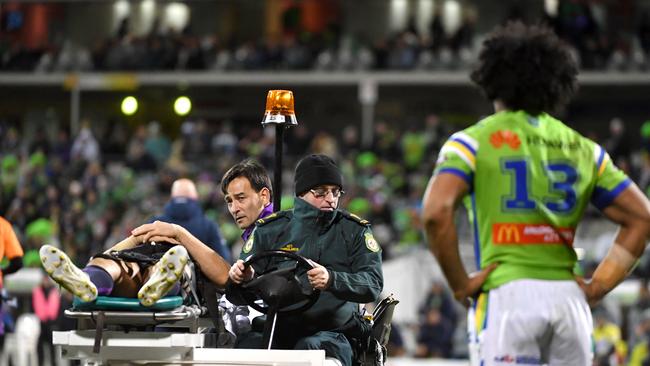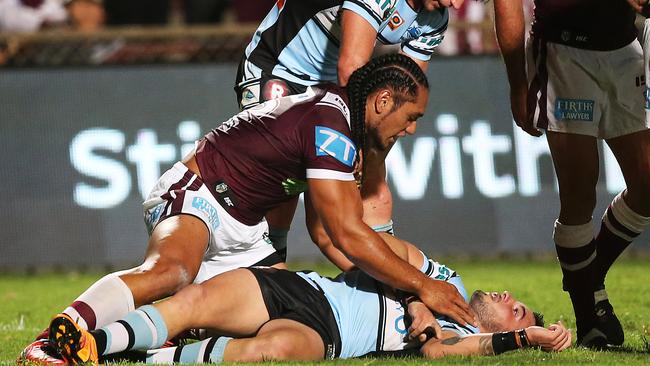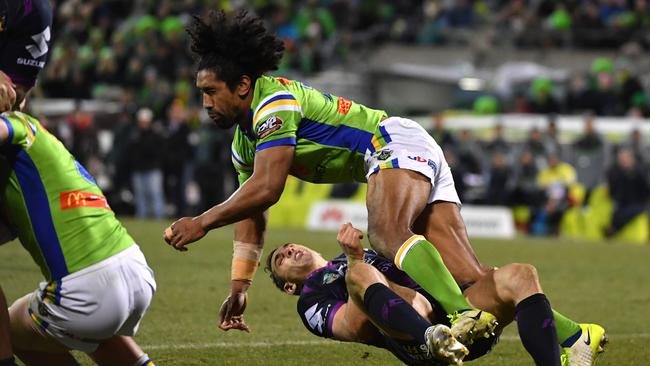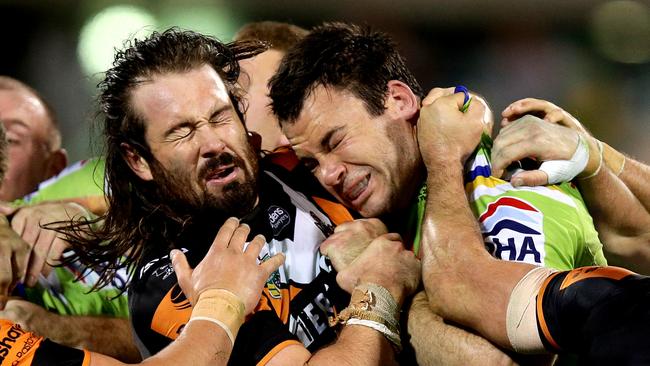The send-off debacle another example of the NRL struggling for identity
THE failure to send Sia Soliola from the field encapsulates one of the NRL’s great struggles writes PAUL KENT — they’re trying to be all things to all people.

Opinion
Don't miss out on the headlines from Opinion. Followed categories will be added to My News.
IN March last year Martin Taupau took down Jack Bird in a shot that was late and high and textbook assault.
The last Bird remembered was running towards the defence with strong ambition. He dropped the ball and turned to retrieve it and while he took more steps towards Taupau, who was cocked and loaded, Taupau swung and landed.
Taupau stayed on the field while Jack Bird’s head ached for three days. It did not matter, the judiciary would make right what the referee did not.
The following day Taupau was hit with a sentence so frighteningly light, just one week, it seemed like a conspiracy.
Three months later match review chairman Michael Buettner admitted to the coaches at their regular conference that the panel got their grading wrong.

Well done to Buettner.
More, the coaches were in such fine spirits they agreed that the Taupau tackle should be deemed send-off worthy and for once there seemed to be universal agreement among them.
The NRL jotted it down.
A year later, we seemed to have forgotten everything, and so once again the NRL assumes its natural state, the forward brace position, as it tries to deal with the fallout of so many mixed messages.
The game needs clarity.
It needs to determine what it is and what it looks like. What it stands for and what it accepts.
Instead the game has again been caught trying to be all things to all people. Tough and combative but family friendly.
Sia Soliola hits Billy Slater late and high on Saturday night and stays on the field while the Melbourne medical staff have a serious discussion about whether Slater needs to go to hospital.

Soliola has mitigating factors in his defence.
Slater slipped and was falling like he was going down a mineshaft when Soliola hit him. But he was late when he should not have been and he cannot defend that.
An hour after the game referees boss Tony Archer put out a statement saying the Soliola tackle met the indicators for a send-off.
They include force. In other words, is the arm swinging? Was the fist clenched?
It includes point of contact. In this case, an arm against a head.
It includes the position of the player struck and whether it was late.
Did the referee miss that? Or did he fail to acknowledge it?
BUNKER: Should Archer go as refs boss?
BUZZ: Why Soliola’s hit hurts the game
Buettner and his men this time made no similar error to last year and referred him immediately to the judiciary, do not pass go.
That Soliola was not sent off, and that the referees boss indicated he should have been, adds to the game’s lazy state of confusion.
The constant add-ons with rules and interpretations shroud the game in complete confusion.
And too often the games makes a decision for its future and forgets its past.
So now the NRL is, apparently, a game where a player will be sent for a 10-minute spell in the sin bin for laying on a player for a second too long, robbing them of the chance to score a try, but a player who illegally takes out an opponent stays on.
LISTEN! Controversy and confusion reigns after Sia Soliola’s high shot on Billy Slater and on this week’s Monday Bunker the panel debate the latest refereeing crisis including what the future is for Tony Archer.
You can also subscribe to League Central via the iTunes store
How did we get here?
In its first years the sin bin was available for foul play. What happened, players would foul an opponent and referees began taking the soft option of sin-binning them instead of sending them off for good.
People protested.
So the game tinkered, declaring the sin bin would be reserved for professional fouls while foul play would result in dismissal.
Only somebody fell in love with the charging system, the safe option, and they forgot about the dismissal altogether as foul play began to get referred.

Here the game should have stepped in and corrected the course.
Now, hardly anybody gets sent.
The difficulty is the last send-off came two years ago when David Shillington got walked in a major over-reaction to a previous violence.
The game is riddled with a lack of confidence. Second-guessing themselves, referees now take the road of safety first.
It has got so out of control the game rules are being strangled by its own interpretations and procedures, dressed up as “indicators”.
That other quality, what the best in any business call instinct, left long ago.
It is up to the game to correct it, though. The referees need to be told how to officiate instead of the other way around.
To do that, the game needs to determine what it wants to look like.
Originally published as The send-off debacle another example of the NRL struggling for identity


